#but with a character like this that distinction between the internal vs external story beats would have been really important in opinion
Explore tagged Tumblr posts
Text
Something else that I saw another person say but
-> ignores the intent and immigrant-coding historically done with the superfam in favor of telling a queer story that doesn't make sense given the basis of kons actual (not TV-showified) character
like, I have Many thoughts about kon and his gender that I could go on about but as a queer trans person of color from an immigrant family I can say this would not have been a good choice to go with. even while ignoring the clear lack of understanding for kon's characterization its just so obvious she did not put in the work to see what his character even was to begin with and instead just invented her own yj show/newer comics-oc mix character with the name "Conner", who in this version would have been Constance, and called it a day.
To be clear I would love to see a prominent trans girl hero in current comics I think that would be wonderful. But. the way this would have gone down? The destruction of a character already so mischaracterized in mainstream circles, who I love so much, and the ignorace towards what the impact of this could have been? That's not good representation, that's just a narrative mess.
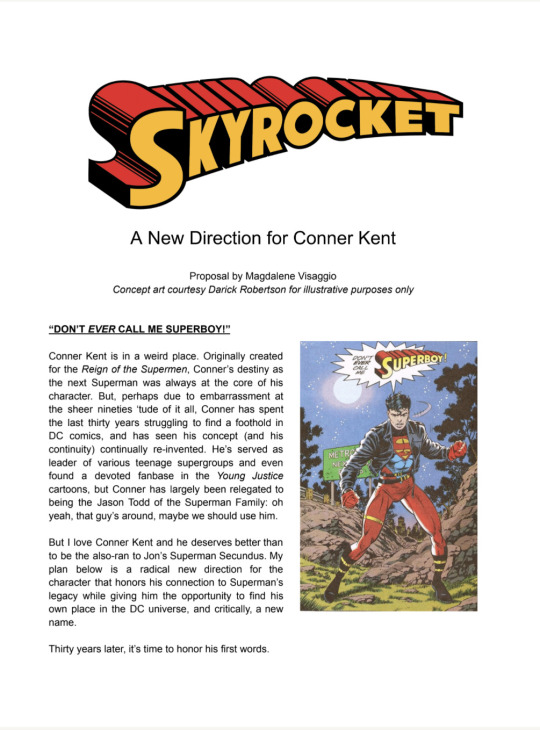
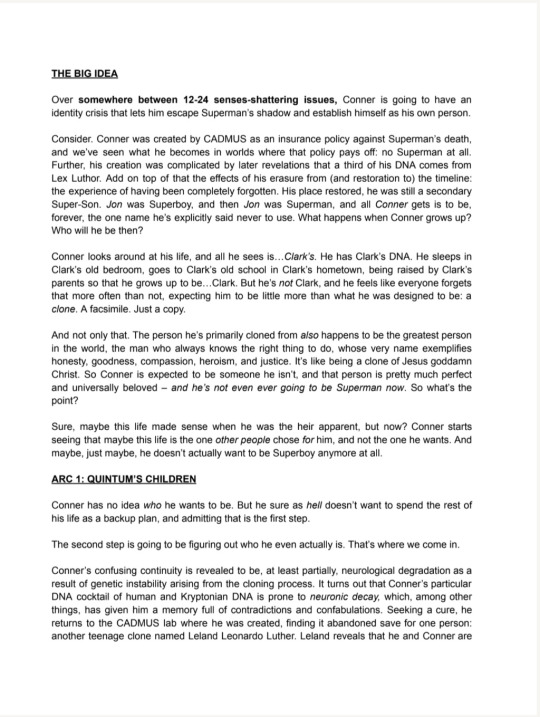
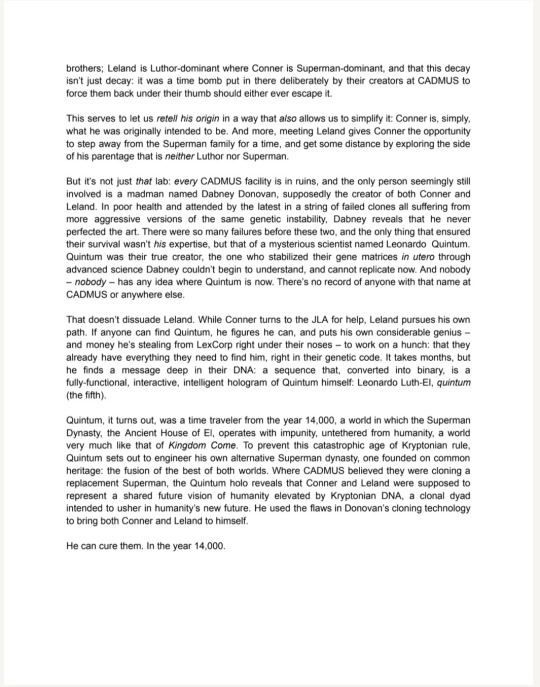
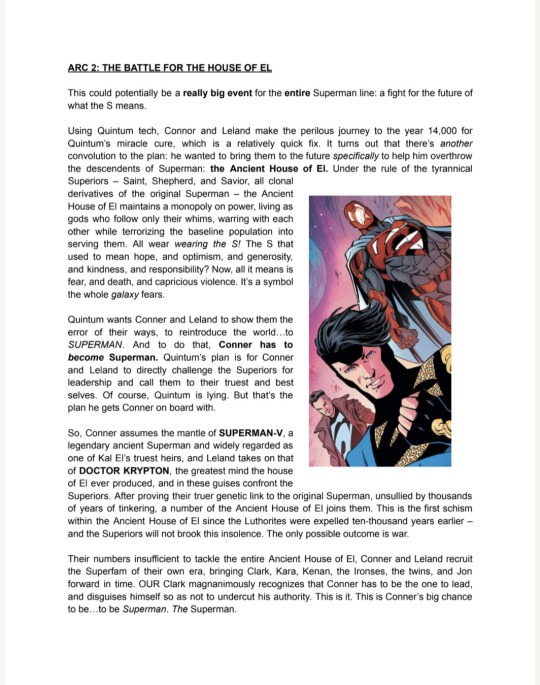
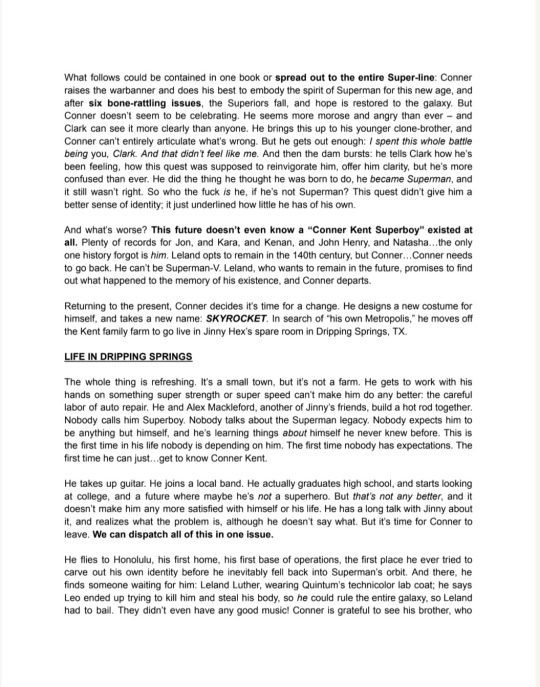
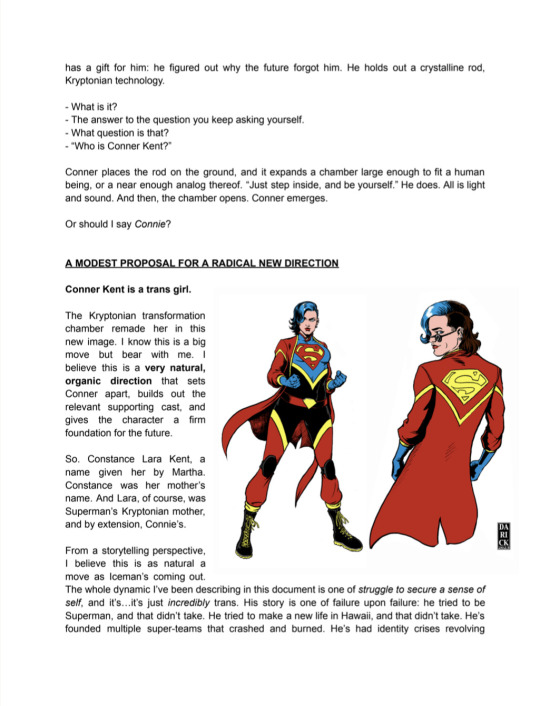
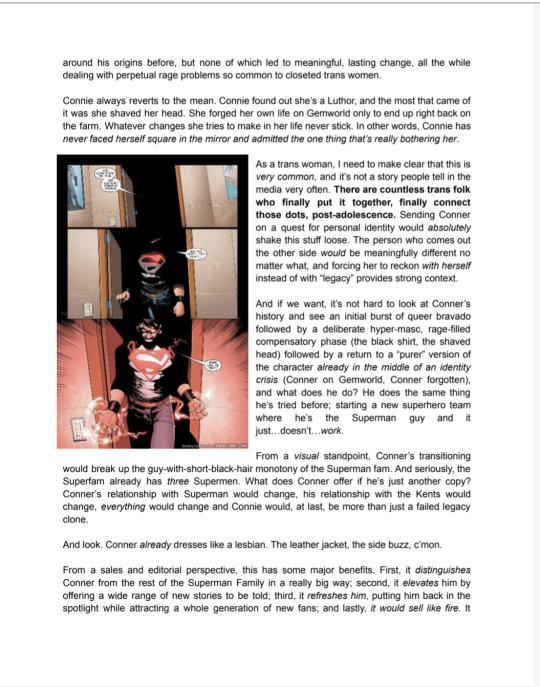
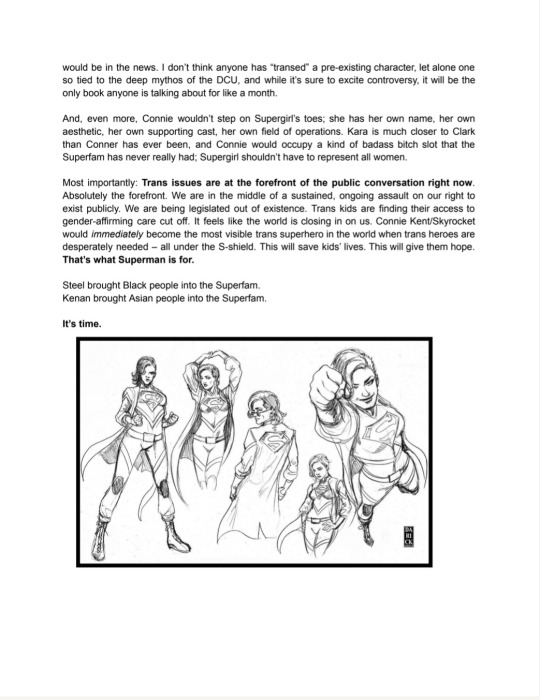
Magdalene Visaggio’s rejected proposal for Kon
#malt rants#kon el#superboy#dc#discourse#<-just in case and more in the tags#edit: left for like an hour and came back. have thought a bit more and my issue has shifted a bit#trans kon could have been incredible and I love the design#I also. in a sense. like the way it could have ended.#however I just have too much of an issue with the process that could have been used to get there#also the constant christian topic was not it for me given yk. Jewish superfam is literally right there.#but I digress#this reads more aggressively oppositional than I intended.#while I don't hate the idea (I could even say I love it as a gnc kon hc haver) I don't like the obvious signs that once it was over#there wouldn't be a version of this character that could be molded into something more legible so to speak#what I mean by that is she would have been great for queer comics lovers everywhere#but she wouldn't have worked in terms of the comics#not in a 'I don't want to trans pre-existing characters genders' way but more in a 'this would have been a bad faith interpretation of his#characters regardless of the trans part' way#as a yj fan I have been waiting for my kids to properly come back from DC comics hell (read: no new comics) for a while#and kon especially given his constant rewrites#and I feel like instead of fixing this problem by giving a stable new and interesting storyline#we just went back to the (highly retconned) basics of his character#and I also have some feelings about the lack of direction for her outside of her new identity#not to say you can't still write a compelling story that way#but with a character like this that distinction between the internal vs external story beats would have been really important in opinion#anyways I rambled on too much. but still I stand by my saying that at the very least this pitch would not have been the greatest#in terms of writing kon true to character#a lovely concept to roll around in my mind though
372 notes
·
View notes
Text
not to be a nerd but i accidentally just wrote a whole impromptu essay about editing ndjsdksksk im throwing it under a cut bc it's fucking inane and really long but honestly... i just want other people to become as passionate about editing as i am lmaooooo
i also recommend 2 books in the post so if anything at least check those out!
quality books about editing... *chef's kiss* a lot of the basic ones (including blog posts online n such) are geared towards beginners and end up repeating the same info/advice, much of it either oversimplified or misrepresented tbh. but i read one yesterday and i'm reading another one right now that really convey this passion for editing + consideration for it as its own sort of art and i just!!
it's such a weird thing to be passionate about lmao but i AM and i've spent a lot of time the past year or so consciously honing my craft (ik i mention this like 4 times a week i'm just really proud of how much i've learned and improved) and kind of like. solidifying my instincts into conscious choices i guess?
and these GOOD editing books have both a) taught me new information and/or presented familiar information through a new perspective that helped me understand something differently or in more depth, and b) validated or even just put into words certain preferences or techniques that i've developed on my own, that i don't normally see on those more basic lists i mentioned
btw the book i finished yesterday is self-editing for fiction writers: how to edit yourself into print by renni brown and dave king, and the one i'm reading currently is the artful edit: on the practice of editing yourself by susan bell.
the former was pretty sharp and straightforward. the authors demonstrated some of their points directly in the text, which was usually funny enough that i would show certain quotes to my sister without context
("Just think about how much power a single obscenity can have if it’s the only one in the whole fucking book." <- (it was)
"Frequent italics have come to signal weak writing. So you should never resort to them unless they are the only practical choice, as with the kind of self-conscious internal dialogue shown above or an occasional emphasis."
or, my favorite: "There are a few stylistic devices that are so “tacky” they should be used very sparingly, if at all. First on the list is emphasis quotes, as in the quotes around the word “tacky” in the preceding sentence. The only time you need to use them is to show you are referring to the word itself, as in the quotes around the word “tacky” in the preceding sentence. Read it again; it all makes sense.")
and like i said, i also learned some new ideas or techniques (or they articulated vague ideas i already had but struggled to put into practice), AND they mentioned some suggestions that ive literally never seen anyone else bring up (not to say no one has! just that ive never seen it, and ive seen a lot in terms of writing tips, advice, best practices, etc) that ive already sort of established in my own writing
for example they went into pretty fine detail about dialogue mechanics, more than i usually see, and in talking about the pacing and proportion of "beats" and dialogue in a given scene, they explicitly suggested that, if a character speaks more than a sentence or two and you plan on giving them some sort of dialogue tag or an action to perform as a beat, the tag or action should be placed at one of the earliest (if not the first) natural pauses in the dialogue, so as not to distance the character too far from the dialogue -- bc otherwise the reader ends up getting all of the dialogue information first, and then has to go back and retroactively insert the character, or what they're doing, or the way they look/sound while they're giving their little speech
and like this was something ive figured out on my own, mostly bc it jarred me out of something i was reading enough times (probably in fic tbh) that i started noticing it, and realized that it's something i do naturally, kind of to anchor the character to the dialogue mechanic to make sure it makes sense with the actual dialogue
so like. ok here's an example i just randomly pulled from the song of achilles (it was available on scribd so i just looked for a spot that worked to illustrate my point djsmsks)
the actual quote is written effectively, but here's a less effective version first:
“Perhaps I would, but I see no reason to kill him. He’s done nothing to me," Achilles answered coolly.
see and even with such a short snippet it's so much smoother and more vivid just by moving the dialogue tag, not adding or cutting a word:
“Perhaps I would, but I see no reason to kill him.” Achilles answered coolly. “He’s done nothing to me.”
the rhythm of it is better, and the beat that the dialogue tag creates functions as a natural dramatic pause before achilles delivers an incredibly poignant line, both within the immediate context of the scene and because we as the readers can recognize it as foreshadowing. plus, it flows smoothly because that beat was inserted where the dialogue already contained a natural pause, just bc that's how people speak. if you read both versions aloud, they both make sense, but the second version (the original used in the novel) accounts for the rhythm of dialogue, the way people tend to process information as they read, AND the greater context of the story, and as a result packs significantly more purpose, information, and effect into the same exact set of words
and THAT, folks, is the kind of editing minutia i can literally sit and hyperfocus on for hours without noticing. anyway it's a good book lmao
the one i'm reading now is a lot more about the cognitive process/es of editing, so there's less concrete and specific advice (so far, anyway) and more discussion about different mental approaches to editing, as well as tips and tools for making a firm distinction between your writer brain and your editor brain, which is something i struggle with
but there have been so many good quotes that ive highlighted! a lot of just like. reminders and things to think about, and also just lovely articulations of things id thought of or come to understand in much more vague ways.
scribd won't let me copy/paste this one bc it's a document copy and not an actual ebook, but this passage is talking about how the simple act of showing a piece of writing to someone else for the very first time can spark a sudden shift in perspective on the work, bc you'll (or at least i) frantically try to re-read it through their eyes and end up noticing a bunch of new errors -
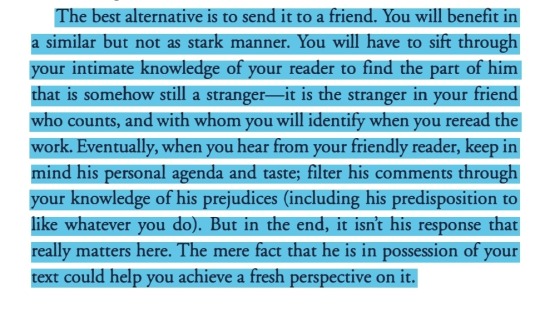
or she talked about the perils of constant re-reading in the middle of writing a draft, which is something i struggle with a LOT, both bc i'm a perfectionist and bc i prefer editing to writing so i sit and edit when i'm procrastinating doing the actual hard work of writing lmao
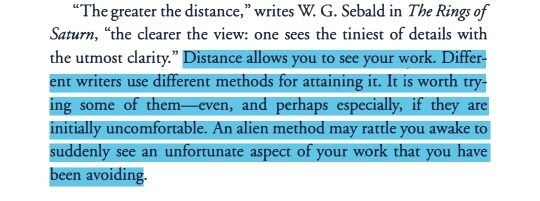
it's just this side of fake deep tbh but i so rarely see editing discussed like this--as a mixture of art and science, a collaboration between instinct and technique, that really requires "both sides of the brain" to be done well.
and because of the way my own brain works, activities that require such a balanced concentration of creativity and logic really appeal to me. even though ive seen a lot of people (even professional writers) who frame it as the creative art of writing vs the logical discipline of editing. but i think that's such a misleading way of thinking about it, because writing and editing both require creativity and logic -- just different kinds! (not to mention that the line between writing and editing, while mostly clear, can get a little blurry from up close)
but like...all stories have an inner logic to them, even if the writer hasn't explicitly or consciously planned it, and even if the logic is faulty in places in the first couple of drafts. when you're sitting and daydreaming about your story, especially if you're trying to figure out how to bridge the gap between two points or scenes (or, how to write a sequence of events that presents as a logical, inevitable progression of cause and effect), the voice in your head that evaluates an idea and decides to 1) go with it, 2) scrap it, 3) tweak it until it works, or 4) hold onto it in case you want it later? that's your logic! if an idea feels wrong, or like it just doesn't work, it's probably because some part of you is detecting a conflict between some part of the idea and the overall logic of your story. every decision you make as you write is formed by and checked against your own experiential logic, and also by the internal logic of your story, which is far less developed (or at least, one would hope), and therefore more prone to the occasional laspe
but while ive seen a number of articles that discuss the logic of writing, i don't see people gushing as much about the art of editing and it's such a shame
the inner editor is so often characterized as the responsible parent to the writer's carefree child, or a relentless critic of the writer's unselfconscious, unpolished drivel
and it's like... maybe you just hate thinking critically about your work! maybe you view it that way because you're imposing external standards too fiercely onto your writing, and it's sucked the joy out of shaping and sculpting your words until they sing. maybe you prefer to conceive of your writing as divine communication, the process of which must remain unencumbered by lessons learned through experience or the vulnerability of self-reflection, until the buzzkill inner editor shows up with all those "rules" and "conventions" that only matter if you're trying to get published
and like obviously the market doesn't dictate which conventions are worth following, but the majority of widely-agreed-upon writing standards, especially those aimed at beginners, (and most especially those regarding style, as opposed to story structure) have to do with the effectiveness and efficiency of prose, and, in addition to often serving as a shorthand for distinguishing an amateur from a pro, overall help to increase poignancy and clarity, which is crucial no matter the genre or type of writing. and even if you personally believe otherwise, it's better to understand the conventions so you can break them with real purpose.
so editing shouldn't be about trying to shove your pristine artistic masterpiece into a conventional mold, it should be about using the creative instincts of your ear and your logic and experience-based understanding of writing as a craft to hone your words until you've told your story as effectively as possible
thank u for coming to my ted talk ✌️
17 notes
·
View notes